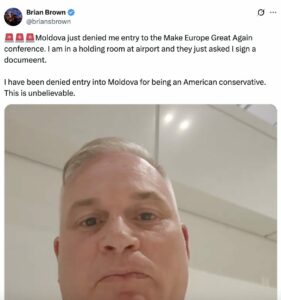MEGA Conferences: The Kremlin’s New Tool To Export Anti-LGBTIQ+ Hate
“Make Europe Great Again” (MEGA) sounds like a tongue-in-cheek riff on Donald Trump’s MAGA slogan. Yet in less than one year, MEGA has become one of the fastest-expanding far-right projects on the continent. It began in the halls of the European Parliament and has since toured Warsaw and Chişinău, drawing in politicians from the European Conservatives and Reformists (ECR), Patriots for Europe, and U.S. religious-right networks.
On the surface, MEGA is branded as a conference for conservatives to debate “family,” “identity,” and “freedom.” In reality, it is much more troubling: a transnational coordination hub laundering Kremlin-aligned narratives into European debates.
The Moldovan edition in July 2025 made this clearer than ever.
Chişinău: the Kremlin’s fingerprints
Just days before the event, Moldova’s Information and Security Service (SIS) issued an extraordinary warning:
“These individuals were to participate in an event with obscure organizers, without transparency of financing and with dubious connections to the Shor criminal group. Based on the information, some participants and organizers aim to promote an extremist agenda to undermine the territorial integrity and democracy of the Republic of Moldova (1) .
The SIS stressed that MEGA was “part of a broader spectrum of hybrid actions undertaken by Russia on the territory of the Republic of Moldova” and warned citizens that “participation, even unintentionally, in such actions orchestrated by external forces brings with it potential legal risks.” (1)
The warning was not abstract. Ilan Shor, a pro-Russian oligarch sentenced for his role in Moldova’s billion-dollar bank fraud and now operating from Moscow, remains a central figure in the networks around MEGA. His allies helped facilitate the Chişinău edition. PR firms like Fortius Consulting, tied to Shor’s associates, have actively shaped narratives around Moldovan politics in EU media outlets such as EU Reporter and EU Today (2).
A burner website and shadow organisation
Suspicion also surrounded the conference’s digital footprint. The official website, mega2025.eu, appeared stripped down to lorem ipsum placeholders and empty tabs. As one investigation noted:
“The Speakers, Program and Live tabs are all blank. Oddly, most of the rest of the website is the same: a mixture of ‘lorem ipsum’ placeholder text and links to past and future conferences that are also devoid of details.” (1)
Earlier versions of the site, captured by the Wayback Machine, told a different story: explicit references to partnerships with ECR and the pro-Russian far-right Alliance for the Union of Romanians (AUR), lists of speakers, and calls for registrations. All of this disappeared before the Moldovan conference (1).
Researchers concluded the site was effectively a “burner page,” geofenced so that it could only be viewed in Moldova and likely to disappear after the conference had served its purpose (1).
Border drama: Brian Brown and the U.S. link

Post on X by Brian Brown on June 27, 2025
The guest list also drew attention. American activist Brian Brown, president of the International Organization for the Family and leader of the World Congress of Families (WCF), was initially denied entry into Moldova, declared persona non grata, and escorted to a removal flight. At the last moment, the decision was reversed, reportedly after intervention by the U.S. Embassy. Brown later thanked the embassy for helping secure his entry (1).
Brown’s presence is significant. The WCF was founded in the US in 1995 as a joint global-American initiative but over the last decades increasingly was absorbed by Russia’s soft power machinery. According to the New York Times, its purpose was to “foster a global network of like-minded conservatives to fight feminism, homosexuality and abortion” (1).
The Southern Poverty Law Center designates WCF as a hate group. It has been widely credited with lobbying for Russia’s 2013 anti-gay propaganda law, a law that became the template for restricting queer expression worldwide (1).
Brown himself has a history in Moldova, organizing and attending a WCF conference in Chişinău in 2018 hosted by then-President Igor Dodon. His return under the MEGA banner cements the event’s role as a bridge between U.S. religious conservatism and Russian-aligned influence operations.
Many have accused Brown to be an agent of the Russian oligarchs Konstantin Malofeev and Vladimir Yakunin. Unsurprisingly, Shor has been accused of working with Yakunin, a WCF-affiliated Russian Oligarch in the past (6).
Who else was stopped at the border?
Brown was not the only figure denied entry. Czech MEP Ondřej Dostál and Greek politician Dimos Thanasoulas were both deported. Thanasoulas, a spokesperson for the sovereigntist party NIKI, is known for his staunch opposition to the rights of LGBTIQ+ people. Dostál’s passport was confiscated before he was placed on a plane out of Moldova (1).
The bans highlight that the Moldovan authorities recognised the event as more than just a conference. It was a security threat.
The website of the MEGA conference in the Moldovan capital also featured well-known far-right politicians such as the Belgian Filip Dewinter, Israel’s Ariel Boulshtein and former Polish MEP Ryszard Czarnecki (7). It is unknown whether they were allowed in Moldova.
From Brussels to Warsaw to Chişinău
The Moldovan edition did not come out of nowhere. MEGA has already been normalised within EU politics.
In early 2025, the ECR-group in the European Parliament hosted an edition of the conference, giving the brand instant institutional legitimacy (3). That event featured prominent ECR members and set the stage for further expansion.
Later that year, Warsaw hosted the fifth MEGA edition, branded as a show of “strength and unity” of the conservative movement in Central and Eastern Europe.
The program revolved around three themes:
- “EU–US relations – the beginning of a new era?”
- “Conservatism and its fundamental role in the face of today’s challenges”
- “How to preserve democracy and common sense” (4).
Participants framed the event as a defence of “Latin civilization,” opposition to EU federalisation, and protection of “identity” from migration and “gender ideology” (4).
Coverage sympathetic to MEGA described Warsaw as “proof that the international conservative movement is becoming increasingly organized,” focusing on family, faith, identity, and “protecting the younger generation from from the imposition of political correctness” (5).
At one point, participants donned blue hats with the slogan “MAKE EUROPE GREAT AGAIN”, a deliberate mirror of Trump’s MAGA campaign (5).
The Fortius connection: PR for the Kremlin’s friends
Investigations into MEGA’s organisation point to Fortius Consulting, a Madrid-based PR firm founded by Juan Ángel Soto Gómez. Fortius has represented figures close to Ilan Shor, including Victoria Şapa, and has been linked to narratives aligning with Shor’s agenda (2).
As one report concludes:
“Ilan Shor’s PR operations highlight how pro-Russian actors can and do operate within the EU’s lobbying ecosystem, to influence policy-makers and shape public opinion. This highlights a major gap in the EU lobbying, PR and sanctions legislation.” (2)
In 2024 alone, EU Reporter published 24 undeclared PR-planted pieces about Moldova, many of them promoting Shor-affiliated figures and portraying Moldova’s government as a “dictatorship.” Fortius was directly involved in these efforts (2).
The loopholes are glaring. While U.S. sanctions on Shor include a ban on hiring consultants or lobbying firms, EU sanctions are far weaker. As a result, sanctioned Moldovan actors remain free to contract PR firms in Europe to push their narratives (2).
Why LGBTIQ+ people are in the crosshairs
For LGBTIQ people, MEGA is not just a conservative networking event. It is the staging ground for rolling back fundamental rights.
The same actors behind MEGA, WCF, Shor-linked networks, and their European allies, are responsible for Russia’s 2013 anti-gay propaganda law. Today, they are pushing identical measures in EU member states: censorship of “gender ideology,” bans on Pride, restrictions on trans healthcare, and foreign-agent laws aimed at silencing NGOs (4).
This is not incidental. As the WCF itself declared decades ago, its mission is to “fight feminism, homosexuality and abortion” (1).
What begins as rhetoric about “protecting children” translates directly into policies that criminalise queer lives and dismantle civil society.
Why this matters for democracy
The danger of MEGA extends beyond the rights of LGBTIQ people. By casting equality work as “foreign interference,” these actors build the scaffolding for authoritarianism. Once the precedent is set that NGOs, journalists, or queer organisers are agents of “Soros” or “Brussels,” it becomes easy to suppress dissent under the guise of defending sovereignty.
Moldova’s SIS has already warned that MEGA is part of Russia’s hybrid warfare strategy. Yet inside the EU, MEGA has enjoyed institutional platforms, from the European Parliament to Warsaw’s political stage.
The risk is clear: if Europe normalises these gatherings, it normalises Kremlin-style tactics of repression at home.
The MEGA roadshow is not a quirky Trumpist import. It is a Kremlin-adjacent influence machine hiding in plain sight, putting LGBTIQ people on the frontline and European democracy in its crosshairs.
The question is not whether MEGA is dangerous. The question is whether Europe will act in time to stop it.
Sources:
- David Smith (2025). MEGA in Moldova: A Made-for-MAGA Moment. Retrieved from https://www.moldovamatters.md/p/mega-in-moldova-a-made-for-maga-moment
- Emma Maréchal (2025). Fortius Consulting, Shor and MEGA. Retrieved from https://www.moldovamatters.md/p/fortius-consulting-shor-and-mega
- Belga (2025). European Parliament hosts second edition of MEGA conference. Retrieved from https://www.belganewsagency.eu/european-parliament-hosts-second-edition-of-mega-conference
- pl (2025). Make Europe Great Again w Warszawie. Retrieved from https://www.tysol.pl/a144882-make-europe-great-again-w-warszawie
- La voce del patriota (2025). Dirty shoes, clean hands: Warsaw opens a new front for a Europe great again. Retrieved from https://www.lavocedelpatriota.it/en/dirty-shoes-clean-hands-warsaw-opens-a-new-front-for-a-europe-great-again/
- Joshua Kirschenbaum, Sergiu Tofilat (German Marshal Fund). Massive Russian Financial Flows Through Moldova Show Small Jurisdictions Matter. Retrieved from https://www.gmfus.org/news/massive-russian-financial-flows-through-moldova-show-small-jurisdictions-matter
- eu (2025). Chisinau hosts the 4th edition of the “Make Europe Great Again” international conference. Retrieved from https://mega2025.eu/chisinau-hosts-the-4th-edition-of-the-make-europe-great-again-international-conference/
Written by:

Rémy Bonny
Executive Director
Bonny is an expert in how ultraconservative and anti-democratic regimes use their fight against human rights for the LGBTIQ+ communities in their international relations.